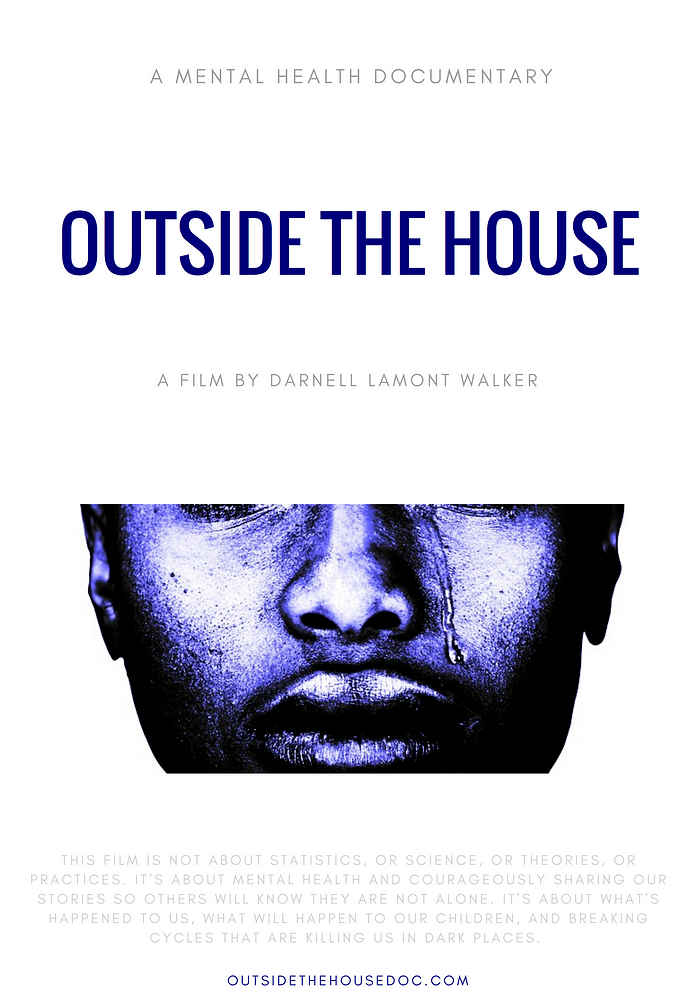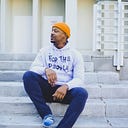Black Mental Health: I Made A Film & Learned These Things

They’ve been practicing racism so long, it’s perfect.
Freddie Gray was murdered in Baltimore by the police one week before I left to backpack through Europe with a few friends until we reached Amsterdam for King’s Day. Those cops and their legal team friends blamed Freddie’s broken spine on the weight of his Blackness, and with many other Black men and women in America when the verdicts came in, I sat still in my home, then my car, then my friends’ homes and thought about the times cops threatened to take my life and how easily they could have placed the blame on the heaviness of my skin.
With a heavy mind and heavier soul, I boarded my flight at LAX for Oslo, Norway. Before skipping down the runway, a text popped up from a friend, asking “why are you going to Norway? You seeking asylum?” I wasn’t. I was going to Norway to dance, eat, laugh, visit the Nobel Peace Center, and stand at the edge of the fjords and smile. But with a heightened fear of returning to America, seeking asylum didn’t seem like a bad idea. “Maybe,” I responded. Little did my friend know, he sent me on a path that led to my first film, Seeking Asylum. Using my cell phone and my old digital camera, I toured around Europe, asking anyone open to talking with me in the Netherlands, Paris, London, and Oslo if they’d welcome Black Americans with open arms if we escaped to their lands out of fear of losing our lives at home.

Racism is everywhere. But as a very frequent traveler who’s been to over 75 countries, America is the only place I fear not making it home to my son for dinner because some racist cop may pull me over, or a man in Florida with cop dreams and a gun may follow me through his neighborhood.
One reoccurring thought throughout the making of Seeking Asylum was how much damage living in a constant state of fear was doing to Black Americans’ mental health. Naturally, when Seeking Asylum was complete and folks began calling me a filmmaker while I toured and spoke around the world about this incredible project, I began thinking about what to create next. Mental health was the only fathomable project. It began with a single question on Facebook: “Black folks. If you’ve sought mental health assistance, what prompted it?” The gates opened and the film was underway.
Fact: being Black in America means living with — at minimum — an extreme amount of stress. This, if nothing else, means we need to talk to navigate through these emotions. We are not okay and that’s not okay, but more and more of us are seeking the help we need and that’s beautiful and path-changing and absolutely amazing. But what of those quietly hiding in those dark rooms, laughing loudly to keep others from hearing the cracking, the slicing, the rattle of the pills, or the tying of the ropes and shirts and ties? What is it they need? How can we help them? Are we able to help them?
We need safe spaces. We need spaces folks can enter and lay their burdens on the table and experience no vulnerability hangover. I became this space for so many, publicly and privately, and I’ve remained. Safe spaces show folks they aren’t alone in their struggle because there are others fighting the same battles and there are others who will help them fight. The safe space is that Facebook post I created that began the film, it’s answering a text when a friend struggling with depression just needs to vent, and it’s sitting silently with someone when there are no words. The most a safe space will require of its builder is vulnerability and that’s fair since we’re asking the same of those who will enter.
We need to begin the process of trusting again. So many of us refuse to speak out because we’re not sure whom to trust with our secrets. These secrets will eat us alive, so they must, by any means, get out, and if that means we must sit in front of a professional and create small talk for weeks on end until we feel we can trust them, then that’s what we must do, but it’s a necessity. I know most people are trustworthy and most people are good, but I also know many folks have shutdown after being mishandled by the not-so-good and find it hard to open themselves back up. We need to find the processes that lead us back to trust.
I’m part of a generation of folks raised by folks who were told to never take their issues outside of the home, so they picked up bottles, pipes, needles, and violence. I’m part of a generation of folks raised by folks whose emotional intelligence was rarely nurtured. A change must come because it is necessary for living as freely as we hope. We have an opportunity to make things better for all those who will look to us for guidance and we have an obligation to ourselves to live our best lives and we can’t do that if there are things we refuse to bring an end to when the means are there to do so.
The film I created with the help of the outstanding and courageous people who hoped their stories of struggle and healing would help others is rightfully titled Outside The House. We spoke openly about suicide, postpartum depression, clinical depression, anxiety, schizophrenia, our fears, finding happiness, navigating through darkness, and finding allies, access, and resources.
“Topically, this will be among the most important films for generations of Black folks who were socialized to keep it all inside. Myself included. Thanks for making it, Darnell.” — Charles H.F. Davis.
“I watched it with tears falling the whole time. I related to the people in your film so much. I’ve struggled with depression and anxiety for a long time and seem to always be stuck. Your film came at the perfect time. I literally made an appointment this morning to see a psychiatrist after being off for about a year because the waves of sadness have been relentless lately. It’s hard to admit you really need that extra help, but I’m trying to remain hopeful. Or trying to remember what hope felt like. Anyway, thank you again for showing that so many of us have these issues, that it’s okay to have them, and for making me think about really starting my career in mental health cause we need more Black and brown professional support.” — L.
We need the resources and access to them. Fixing our mental health isn’t easy and it isn’t always free. Since the film’s completion in 2017, thousands have contacted me asking if I could assist them in searching for proper providers, and in most cases, together, we found community agencies local to them they never knew existed. And in majority of those cases, the resources were free or provided grants and scholarships. This began many community initiatives to ensure everyone in these communities was provided with the information.
What surprised me most after making this film was the number of mental health professionals who look at me as a subject matter expert. I’m not able assess and diagnose, but I am able to advocate, research, and support, and I will do that until I no longer can. I’ve been invited into classrooms, office spaces, and facilities to speak to those learning to be mental health professionals and those who’ve been in the field for quite some time about what I’ve learned while making this film about Black mental health. I’ve learned there are professionals who want to be better in their efforts to help us. I do my best to save every life that seems close to ending, but remaining fully aware that it won’t always be possible.
We need to talk.

I am still traveling with each film, visiting colleges, organizations, clinics, facilities, community centers, and more. Feel free to share with those who may need it. Feel free to contact me: darnell.walker@me.com.
